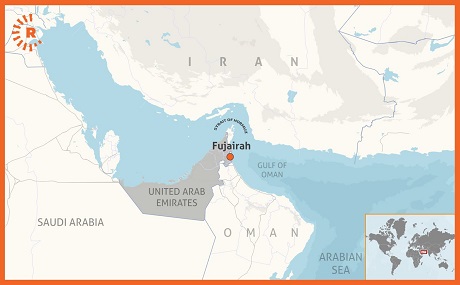ERBIL, Kurdistan Region — Iran said Wednesday it has begun scaling back on its commitments to the 2015 nuclear deal in response to Washington’s sanctions program, a move that could further escalate tensions in the region and place European signatories of the Joint Comprehensive Plan of Action (JCPOA) in a difficult position.
“The implementation of the process of halting some of the country’s commitments to JCPOA which was emphasized in the statement of the Supreme National Security Council has begun,” an anonymous source from the Atomic Energy Organisation of Iran told Tasnim news.
Iran’s powerful Supreme National Security Council vowed earlier this month that Tehran would scale back on two of its commitments dealing with the shipping of enriched uranium and heavy water and gave the remaining members of the historic accord 60 days to confront Washington and save the deal.
The Trump administration ended two critical waivers in early May that allowed Iran to ship enriched uranium in excess of 300kg and send surplus heavy water exceeding 130 metric tonnes to Oman. This means Iran cannot continue producing low enriched uranium and heavy water because it would exceed the amount permitted under the deal.
The announcement came a day after Iran’s Supreme Leader Ali Khamenei said negotiation with the current US administration is ”poison” and urged Iran’s leadership to listen to the demands of citizens as sanctions take their toll on living standards.
“The fundamental option of the people of Iran in confronting the enemy is resistance in every field. Because negotiation with the current American administration is additional poison,” Khamenei said while warning the leadership about a ‘reactionary’ response against the enemy.
“For sure, there will be no war, and in reality the confrontation is the battle of wills and in this regard the will of the people of Iran is stronger than the enemy and with the grace of Allah, this time we will be victorious again.”
The sabotage attack on four vessels, including two from Saudi Arabia in the strategic port of Fujairah, United Arab Emirates on Sunday has caused further complications with initial US investigations pointing the finger at Iranian or Iranian-backed forces. Tehran vehemently denies any involvement.
The attack on the vessels near the strategic Strait of Hormuz was followed by yet another daring raid by Yemeni Houthis on Saudi oil installation.
Almasirah, the main mouthpiece of the Houthis, backed by Iran’s Islamic Revolutionary Guard Corps (IRGC), reported on Tuesday that seven armed drones attacked two oil pumping stations. Saudi officials condemned the “cowardly” attack.
The Trump administration recently designated the 120,000 strong IRGC as a foreign terrorist organization. In a reciprocal step, Tehran designated US Central Command (CENTCOM) as a terrorist organization.
Hamid Baeidinejad, the Iranian ambassador to the UN, warned on Tuesday that President Trump is playing a “very dangerous game” and accused some of his advisors of pushing for war - a conflict that would be “devastating” for Iran and the US.
“We do not know who attacked the tankers. It’s very serious for us. For hours after the incident, the United Arab Emirates declined to give any comment and then, all of a sudden, in a concerted effort, statement after statement was made that Iran or its so-called proxies were likely to be engaged. This is very dangerous and suspicious,” the ambassador told reporters.

Graphic: Sarkawt Mohammed / Rudaw
Escalating tensions in the region have led to splits among commanders within the international coalition fighting the Islamic State (ISIS).
Maj. Gen. Chris Ghika, a British deputy commander of Operation Inherent Resolve (OIR), told reporters at the Pentagon on Tuesday: “There’s been no increased threat from Iranian-backed forces in Iraq and Syria.”
CENTCOM, which is responsible for US military activities in the Middle East and Afghanistan, fired back, stating: “Recent comments from OIR's Deputy Commander run counter to the identified credible threats available to intelligence from US and allies regarding Iranian backed forces in the region.”
“US Central Command, in coordination with Operation Inherent Resolve, has increased the force posture level for all service members assigned to OIR in Iraq and Syria. As a result, OIR is now at a high level of alert as we continue to closely monitor credible and possibly imminent threats to US forces in Iraq,” it added.
President Hassan Rouhani whose government negotiated the 2015 nuclear deal is under intense pressure from the hardliners in the country to be more aggressive toward President Donald Trump egged on by hawks to squeeze Iran further.
“Some erroneously say that we gave 60 days for them to act within 60 days. This is while we have acted since May 8 and put aside two of the commitments and we will put aside two other commitments after 60 days,” Rouhani said in the same meeting with the Supreme Leader on Tuesday with other officials in attendance.





Comments
Rudaw moderates all comments submitted on our website. We welcome comments which are relevant to the article and encourage further discussion about the issues that matter to you. We also welcome constructive criticism about Rudaw.
To be approved for publication, however, your comments must meet our community guidelines.
We will not tolerate the following: profanity, threats, personal attacks, vulgarity, abuse (such as sexism, racism, homophobia or xenophobia), or commercial or personal promotion.
Comments that do not meet our guidelines will be rejected. Comments are not edited – they are either approved or rejected.
Post a comment